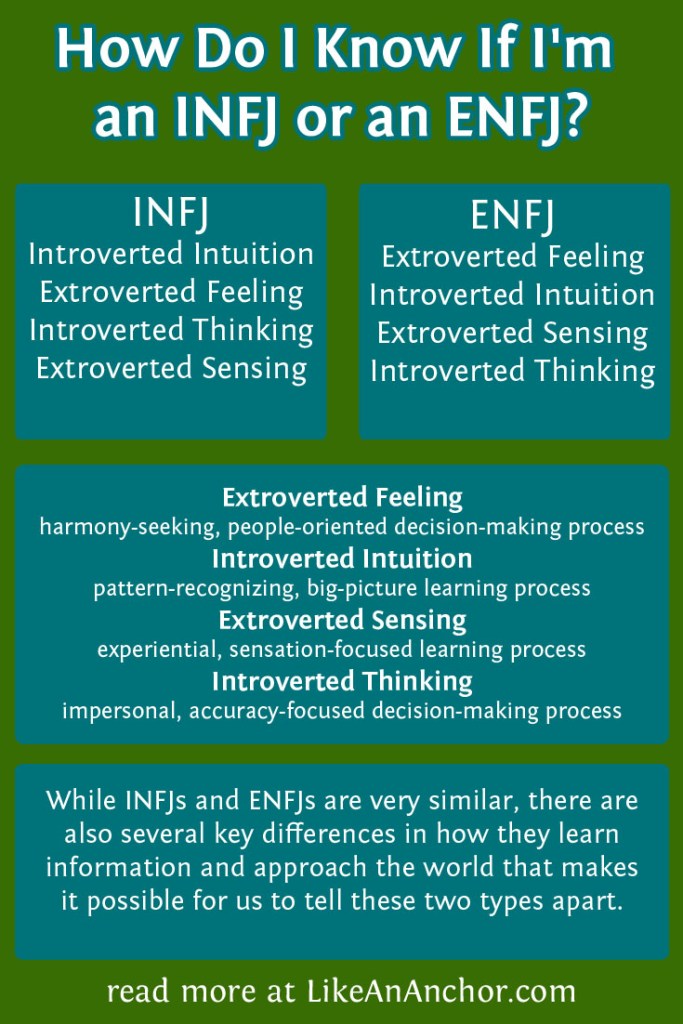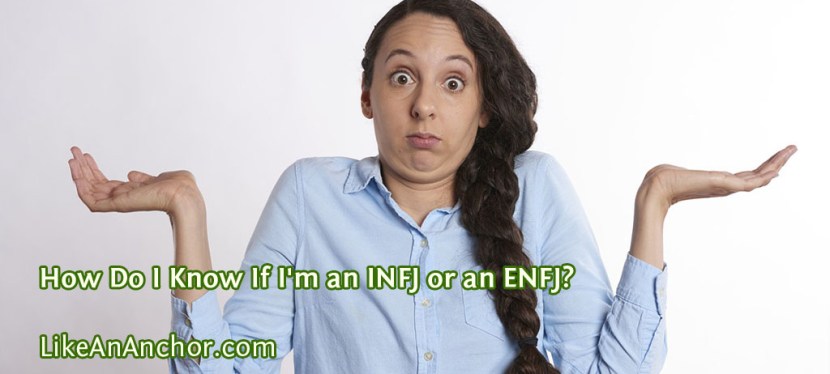One of the questions that often comes up after someone learns about Myers-Briggs® types is how to tell which of two similar types they are. Maybe you took a few different online tests and they gave you a couple different results. Or maybe you started reading about the types and discovered more than one that sounds a lot like you.
If you’re trying to decide whether you’re more of an INFJ or an ENFJ type, I hope this article will help. Just looking at the names of these personality types, we might think that the only difference between them is that one is more extroverted than the other. This is only party true. When we dive deeper into the cognitive functions that describe the mental processes each Myers-Briggs® type uses, it become easier to see the differences and similarities between these two types more clearly.
If you’re not familiar with cognitive functions, click here to read “The Simplest Guide to Myers-Briggs® Functions Ever.” INFJ and ENFJs both use the same cognitive functions. They just use them in a different order of preference, as shown in this graphic:
The way these cognitive functions work together makes ENFJs and INFJs very different in certain ways and very similar in others. The two types can often find lots of common ground and make great friends. But there are also several key differences in how they learn information and approach the world that makes it possible for us to tell these two types apart.
They prioritize the world differently
INFJs and ENFJs lead with different functions and those functions have different orientations. INFJs, who lead with an introverted function, are oriented to the inner world as the one that’s most real. For ENFJs, who lead with an extroverted function, it’s the outer world that captures the bulk of their attention.
- If you’re an INFJ, spending time in the inner world energizes you. You tend to approach life from a thoughtful, introspective place. Isabel Myers said introverts, “Cannot live life until they understand it.” You make sense of the outer world by first looking inside yourself.
- If you’re an ENFJ, spending time in the outer world energizes you. You tend to approach life from an open, more experience-focused place. Isabel Myers said extroverts, “Cannot understand life until they have lived it.” You make sense of the inner world by first looking outside yourself.
Judging and Perceiving differences
The introvert-extrovert dynamic also influences whether a type leads with their Judging function (in this case Feeling) or their Perceiving function (in this case Intuition). The J/P preference in Myers-Briggs describes how someone relates to the outer world. Since INFJ and ENFJ are J-types, both like order in their outer world. However, since INFJs lead with Introverted Intuition and it is a perceiving function, INFJs are actually a dominant perceiving type. ENFJs lead with Extroverted Feeling and are a dominant judging type.
- If you’re an INFJ, you’ll typically find that your Intuitive side is the one that feels most comfortable. Pattern-recognition, big-picture thinking, and seeing things from multiple perspectives come naturally to you. You probably place a higher value on experiencing and understanding life than on controlling it.
- If you’re an ENFJ, you’ll typically find that your Feeling side is the one that is most comfortable. Reading other people, picking up on and meeting their needs, and interacting with them in ways that keep everyone happy come naturally to you. You probably place a higher value on having things settled and decided than on experiencing life as it happens.
Your co-pilot’s influence
INFJs and ENFJs both have the same two functions as the ones they use most comfortably. The only difference is which function is their preferred process and which one is used as the co-pilot process. We’ve already looked at their dominant functions, so now it’s time for the co-pilot.
- If you’re an INFJ, you support your Intuition with a Feeling side that helps you relate to the outer world and made decisions. You probably notice it most when decision-making or trying to relate to other people, because it helps you figure out how social groups work and make decisions that will meet everyone’s needs. It’s not your most comfortable process, but you can get really good at using Extroverted Feeling if you take the time to grow and develop it.
- If you’re an ENFJ, you support your Feeling with an Intuitive side that helps you understand the inner world and learn new information. You probably notice it most when you’re learning and processing information, because it helps you put patterns together and look at something from a new perspective. It’s not your most comfortable process, but you can get really good at using Introverted Intuition if you take the time to grow and develop it.
What happens in the loop
Our co-pilot process is not oriented the same way as our primary process (i.e. it’s extroverted for introverts and introverted for extroverts). Because we tend to be more comfortable with processes that work in our preferred world we often bypass our co-pilot process and try to use our tertiary process instead. This is called a “loop,” and here’s what it looks like for each of the two types we’re discussing today:
- If you’re an INFJ, you have Introverted Intuition as your primary function and Introverted Thinking as your tertiary. When you get into a “loop,” you become more analytical and focused on trying to organize things logically. You might become fascinated by certain topics and spend hours researching everything about them. If you spend too much time in this loop you may loose touch with your more diplomatic, relational side. This can lead to withdrawing from people and becoming more critical and defensive.
- If you’re an ENFJ, you have Extroverted Feeling as your primary function and Extroverted Sensing as your tertiary. When you get into a “loop,”you may get too caught-up in outer world experiences and become easily distracted by irrelevant details in the outer world. If you spend too much time in the loop, you might become impulsive, overly self-indulgent, and distracted from your long-term goals. You might also become more preoccupied with how other people see you.
How you are under stress
When people are trying to find their best-fit personality type, they often focus on figuring out which cognitive function they’re most comfortable with. But the functions that you don’t use well can also give us clues as to what personality type we are. The inferior function (the lowest on a four-function stack) typically shows up when we’re stressed. You might also use it to take a break and relax, and it often shows up in our favorite hobbies.
- If you’re an INFJ, stress can bring out your inferior Extroverted Sensing. When stressed-out, you can become obsessively focused on external data, overindulge in sensory pleasures (food, drink, shopping, etc), and develop a suspicious, hostile attitude toward the outer world. You can also use this function in a healthy way, and you might find that you enjoy activities that require sensory engagement (like gardening, cooking, or kayaking).
- If you’re an ENFJ, stress can bring out your inferior Introverted Thinking. When stressed-out, you can become excessively critical (of self and others), start using convoluted logic to try and solve problems on your own, and feel a compulsive need to take some action to set things right. You can also use this function in a healthy way, and you might find that you enjoy activities that require analytical reasoning (like strategy games or working with computers).
Before you go …
 As a final note, I want to point out that there is plenty of room for individual variation within a type. Myers-Briggs® simply describes how your mind works. It doesn’t tell you everything about yourself. You’ll often find elements of yourself in several type descriptions. Similarly, not every description for a specific type will fit you exactly. You’re looking for your “best fit” personality type rather than one that’s exactly perfect.
As a final note, I want to point out that there is plenty of room for individual variation within a type. Myers-Briggs® simply describes how your mind works. It doesn’t tell you everything about yourself. You’ll often find elements of yourself in several type descriptions. Similarly, not every description for a specific type will fit you exactly. You’re looking for your “best fit” personality type rather than one that’s exactly perfect.
- If you’d like to know more about the INFJ personality type, check out my book The INFJ Handbook. I just updated it with a ton of new information and resources. You can purchase it in ebook or paperback by clicking this link.
What do you think? Did this article help you narrow-down which personality type you are? Share your thoughts in the comments!
Featured image credit: Robin Higgins via Pixabay

I’m definitely an INFJ.
LikeLiked by 1 person
im definetly both
LikeLike
Definitely an Enfj.
LikeLike
I still have no idea… pls someone help me!!
LikeLike